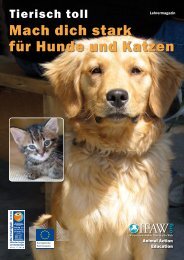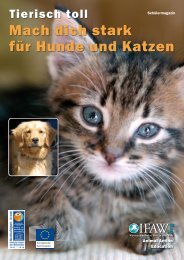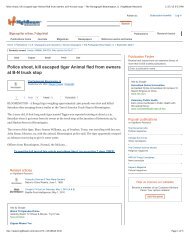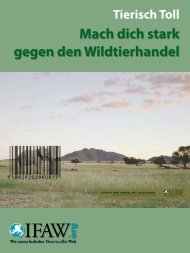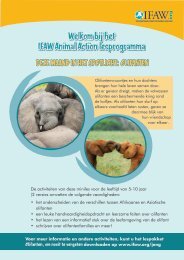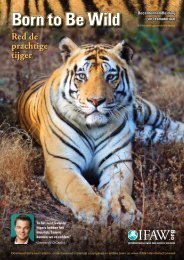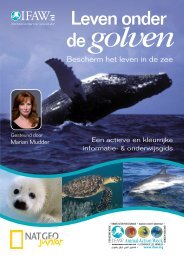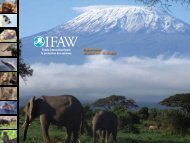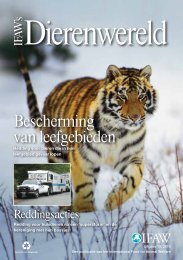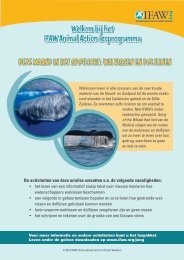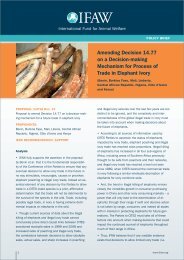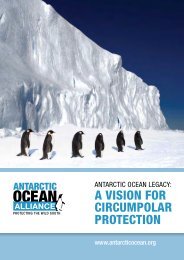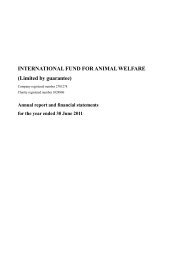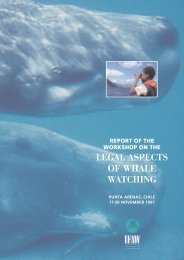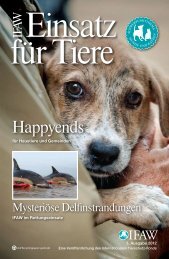Born to Be Wild - International Fund for Animal Welfare
Born to Be Wild - International Fund for Animal Welfare
Born to Be Wild - International Fund for Animal Welfare
You also want an ePaper? Increase the reach of your titles
YUMPU automatically turns print PDFs into web optimized ePapers that Google loves.
<strong>Born</strong> <strong>Born</strong> <strong>to</strong> <strong>to</strong> <strong>Be</strong> <strong>Be</strong> <strong>Wild</strong> <strong>Wild</strong><br />
Saving the<br />
Majestic<br />
Ti g e r<br />
“<strong>Wild</strong> tigers are in<br />
trouble. Together,<br />
we can save them.”<br />
–Leonardo DiCaprio<br />
English/Language Arts<br />
1. Reading <strong>for</strong> Perspective<br />
Students read a wide range of print and nonprint texts <strong>to</strong> build an understanding of texts,<br />
themselves, and of the cultures of the United States and the world; <strong>to</strong> acquire new in<strong>for</strong>mation;<br />
<strong>to</strong> respond <strong>to</strong> the needs and demands of society and the workplace; and <strong>for</strong> personal fulfillment.<br />
1<br />
Lesson<br />
1 2 3 4<br />
• ✓<br />
3. Reading Strategies<br />
Students apply a wide range of strategies <strong>to</strong> comprehend, interpret, evaluate, and appreciate texts. ✓ •<br />
4. Communication Skills<br />
Students adjust their use of spoken, written, and visual language <strong>to</strong> communicate effectively<br />
with a variety of audiences and <strong>for</strong> different purposes.<br />
5. Communication Strategies<br />
Students employ a wide range of strategies as they write and use different writing process<br />
elements appropriately <strong>to</strong> communicate with different audiences <strong>for</strong> a variety of purposes.<br />
6. Apply Knowledge<br />
Students apply knowledge of language structure, language conventions, media techniques,<br />
figurative language, and genre <strong>to</strong> create, critique, and discuss print and nonprint texts.<br />
7. Research Skills<br />
Students conduct research on issues and interests by generating ideas and questions and<br />
by posing problems. They gather, evaluate, and synthesize data from a variety of sources <strong>to</strong><br />
communicate their discoveries in ways that suit their purpose and audience.<br />
• • ✓<br />
• • •<br />
• • •<br />
8. Synthesize In<strong>for</strong>mation<br />
Students use a variety of technological and in<strong>for</strong>mation sources <strong>to</strong> gather and synthesize<br />
in<strong>for</strong>mation and <strong>to</strong> create and communicate knowledge. ✓ •<br />
Science<br />
Teaching Guide<br />
and Lessons<br />
Advanced Reader Edition<br />
Download additional copies, supporting resources, and multilingual versions online at IFAW.org/education.<br />
1. Science as Inquiry<br />
Students should develop:<br />
• the abilities necessary <strong>to</strong> do scientific inquiry<br />
• understandings about scientific inquiry<br />
<strong>Born</strong> <strong>to</strong> <strong>Be</strong> <strong>Wild</strong>:<br />
Saving the Majestic Tiger<br />
U.S. Standards Correlation<br />
Advanced Reader—Grades 5–8<br />
3. Life Science<br />
Students should develop an understanding of:<br />
• structure and function in living systems • populations and ecosystems<br />
• reproduction and heredity • diversity and adaptations of organisms<br />
• regulation and behavior<br />
•<br />
• ✓<br />
✓ ✓ • •<br />
✓These standards are well covered by the lesson. • These standards are <strong>to</strong>uched on in the lesson.



